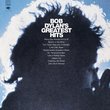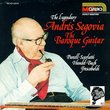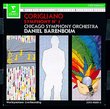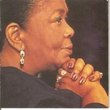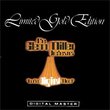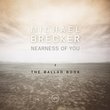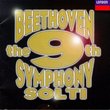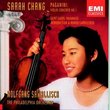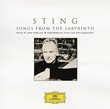| All Artists: Samuel Barber, Charles Münch, Kenneth Slowik, Canadian Brass, Kalmen Opperman Clarinet Choir, Tokyo String Quartet, Smithsonian Chamber Players, Boston Symphony Orchestra, David Pizarro Title: Barber's Adagio / Munch, Galway, Boston SO Strings Members Wishing: 0 Total Copies: 2 Label: RCA Release Date: 5/20/1997 Genre: Classical Styles: Opera & Classical Vocal, Chamber Music, Historical Periods, Classical (c.1770-1830) Number of Discs: 1 SwapaCD Credits: 1 UPC: 090266875825 |
Search - Samuel Barber, Charles Münch, Kenneth Slowik :: Barber's Adagio / Munch, Galway, Boston SO Strings
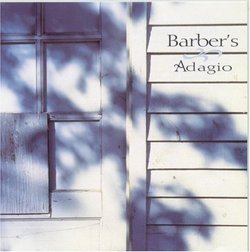 | Samuel Barber, Charles Münch, Kenneth Slowik Barber's Adagio / Munch, Galway, Boston SO Strings Genre: Classical
Samuel Barber's Adagio for Strings is a powerful piece, packed with emotional intensity yet also extraordinarily listenable--and popular. Here, Barber's short masterwork of simplicity and resonance gets eight treatments, f... more » ![header=[] body=[This CD is available to be requested as disc only.]](/images/attributes/disc.png?v=15401716) ![header=[] body=[This CD is available to be requested with the disc and back insert.]](/images/attributes/disc_back.png?v=15401716) ![header=[] body=[This CD is available to be requested with the disc and front insert.]](/images/attributes/disc_front.png?v=15401716) ![header=[] body=[This CD is available to be requested with the disc, front and back inserts.]](/images/attributes/disc_front_back.png?v=15401716) |
Larger Image |
CD DetailsSynopsis
Amazon.com Samuel Barber's Adagio for Strings is a powerful piece, packed with emotional intensity yet also extraordinarily listenable--and popular. Here, Barber's short masterwork of simplicity and resonance gets eight treatments, from those he approved of (Charles Munch and the strings of the Boston Symphony; the Tokyo String Quartet; organist David Pizarro; and the Smithsonian Chamber Players) to new interpretations that don't quite match with the older renditions. James Galway's new flute-and-synthesizer reading is a bit anemic, though thankfully not showy, and the Canadian Brass's arrangement is likewise tempered and calm, even if not very close to having significant bite. Richard Stoltzman and the Kalman Clarinet Choir probably do the best job of taking Barber to new places; the woody tones mesh almost polyphonically. Also included is the Choir of Trinity College's reading of Agnus Dei, Barber's choral setting of the Adagio, a distillation that might well be the high point of the CD. For the most stunning rendition of the Adagio, however, listeners should really hear the Thomas Schippers version. --Andrew Bartlett Similarly Requested CDs
|
CD ReviewsGreat intro to Barbers'Adagio panolux | 02/17/2000 (4 out of 5 stars) "I found this recording while continuing my search for my all-time favorite version of the Adagio.While nothing on this album approaches the perfection of my favorite recording,it is a wonderful collection of the various treatments of Barbers'work.I find the vocal ensemble to be the most satisfying but found that,really the appeal of this cd is the movement from one version to the next.I have listened to as many versions as I can find of the Adagio and I finally found the version that is Perfect in all aspects of the piece:the 1957 recording by the Philadelphia Orchestra,conducted by Eugene Ormandy.It can only be found on a Sony release entitled"American Masterpieces".It is the definitive recording in my opinion,and I am a hardcore fan of the Adagio!" Passionate yearning with a touch of hope Robin Currier | 11/01/2004 (5 out of 5 stars) "What a very interesting CD! Barber's Adagio is one of the best-loved pieces of classical music. It embodies passionate yearning, building to an extraordinary climax, and coming back to down to a peaceful resolution. When Barber first created this music as the adagio movement to a string quartet, it took the classical world by storm, and he later created a full orchestral version and a choral version. Setting the choral version to the words of the Agnus Dei: "Lamb of God, who takes away the sins of the world, have mercy on us" was an inspired choice. What could better express the pleading, emotional intensity of this music? Putting together 8 versions of this piece was a very interesting idea. It made me think of a great chef designing a meal in which all of the courses are soup! Each dish may be wonderful, but you'd better like soup! Fortunately, I love soup--er, Barber's Adagio--so it works for me. Of course, some versions of the dish work better than others. The full orchestal version by the Boston Symphony Orchestra expresses the full emotional power of the piece, and I loved it. For me, the James Galway flute (with synthesizer?) version just didn't work. While I love James Galway and the flute, the real power of the piece comes from the blend of parts. By separating a solo line for the flute from the rest of the musical lines, the piece just sounds thin and incomplete, with the full complexity of the piece missing. The Canadian Brass version worked for me because all of the brass blended to provide a full, rich sound. My favorite version was the choral Agnus Dei by the Choir of Trinity College, a very moving performance with full emotional intensity. A very interesting version was the Kalmen Opperman Clarinet Choir. Unlike the flute version, performing all parts on clarinet provides a full, smooth sound, due to the darker tone of the clarinet and the interplay of multiple clarinets. The Tokyo Quartet performs a lovely string version that may be the closest to what Barber originally had in mind. " "Wow..." Alan K. | Michigan, USA | 08/22/2002 (5 out of 5 stars) "What more can one say about Barber's Adagio for Strings? Indeed, how much could one say about it before? I cannot find an appropriate way to describe this music. It is as if all of the holiness of Heaven, or of the sacred 'om,' was compressed into a song lasting nary 8 or 9 minutes. It is melancholic without seeming at all sad, like dying without grief or despair. It brings forth tears stemming from an emotion that, like the song itself, defies description.All that I just wrote is merely language; the only way to know anything about Adagio is to hear it for yourself. This CD holds some of the finest recordings of Barber's famous work. Start off with the first track, and hear the song using its most gut-wrenching arrangement: the string orchestra. Listen to the track in its entirety; you will reach emotional peaks that can't be found with any other song. Then, listen to the choral arrangement. This track alone is worth twice the cost of the CD. I don't think I've ever felt more serene than when I first heard Agnus Dei. It is an absolutely haunting and breathtaking recording which will stay floating in your mind long after you've turned off your CD player.Even if every other recording on this collection was putrid slop, it would get 5 stars. Luckily, the rest of the tracks are still amazing. I was particularily taken by the Canadian Brass version, though this may be due in part to my bias toward brass ensembles. The string quartet also pulls through with another astounding recording of Adagio. The arrangement for organ had an undeniable human touch to it. It was different, but not really any worse than the others. However, I'd have to say that I wasn't much impressed by the flute & synth version. It was far too shrill and brief to have the same howitzer-like emotional wallop as the other recordings.Truthfully, though, the most serious complaint I can put against this CD is that some of the tracks were less blindingly awe-inspiring than others. There is nothing here that should keep you from ordering this compilation at this very second. It has many of the best recordings of perhaps the best song ever put to paper. All the rest of the "powerful" music collections will seem rather silly by comparison."
|

 Track Listings (8) - Disc #1
Track Listings (8) - Disc #1